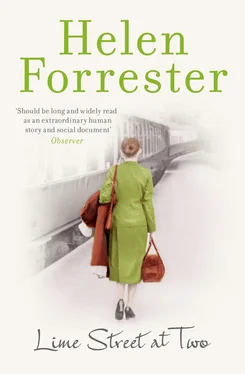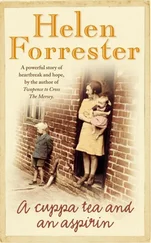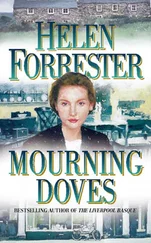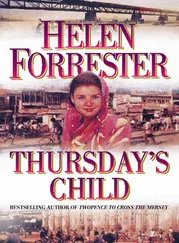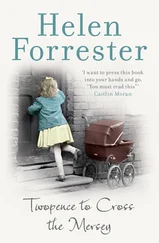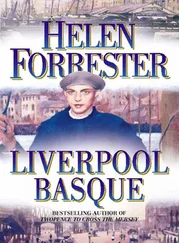HELEN FORRESTER
Lime Street at Two
Published by HarperCollins Publishers Ltd
The News Building
1 London Bridge Street
London SE1 9GF
www.harpercollins.co.uk
First published in Great Britain by HarperCollins Publishers 2012
This edition published by Harper 2016
Copyright © the estate of Jamunadevi Bhatia 1985
Cover layout design © HarperCollins Publishers Ltd 2016
Cover photograph © Picture Post /Hulton Getty
HarperCollins has made every effort to find copyright holders and obtain permission for the use of copyright material in this book. If any material has been used without the owner’s permission please contact HarperCollins and we will give appropriate in future reprints or editions of this book.
Helen Forrester asserts the moral right to be identified as the author of this work.
A catalogue copy of this book is available from the British Library.
This novel is entirely a work of fiction. The names, characters and incidents portrayed in it are the work of the author’s imagination. Any resemblance to actual persons, living or dead, events or localities is entirely coincidental.
All rights reserved under International and Pan-American Copyright Conventions. By payment of the required fees, you have been granted the non-exclusive, non-transferable right to access and read the text of this e-book on screen. No part of this text may be reproduced, transmitted, down-loaded, decompiled, reverse engineered, or stored in or introduced into any information storage and retrieval system, in any form or by any means, whether electronic or mechanical, now known or hereinafter invented, without the express written permission of HarperCollins.
Source ISBN: 9780008180942
Ebook Edition © Dec 2016 ISBN: 9780007373857
Version: 2016-11-09
To my husband
The generals, the institution can
select a strategy, lay it out,
but what happens on the battlefield
is quite different.
Count Lev Nikolaevich Tolstoi
(1828–1910)
Table of Contents
Cover
Title Page
Copyright
Dedication
Epigraph
Chapter One
Chapter Two
Chapter Three
Chapter Four
Chapter Five
Chapter Six
Chapter Seven
Chapter Eight
Chapter Nine
Chapter Ten
Chapter Eleven
Chapter Twelve
Chapter Thirteen
Chapter Fourteen
Chapter Fifteen
Chapter Sixteen
Chapter Seventeen
Chapter Eighteen
Chapter Nineteen
Chapter Twenty
Chapter Twenty-One
Chapter Twenty-Two
Chapter Twenty-Three
Chapter Twenty-Four
Chapter Twenty-Five
Chapter Twenty-Six
Chapter Twenty-Seven
Chapter Twenty-Eight
Chapter Twenty-Nine
Chapter Thirty
Chapter Thirty-One
Chapter Thirty-Two
Chapter Thirty-Three
Chapter Thirty-Four
Chapter Thirty-Five
Chapter Thirty-Six
Chapter Thirty-Seven
Chapter Thirty-Eight
Footnotes
Keep Reading …
About the Author
By Helen Forrester
About the Publisher
The huge clock still hangs in Lime Street station, Liverpool, and marks a convenient spot for travellers to be met. During World War II, almost every girl in Liverpool must have written to a serviceman coming home on leave, ‘I’ll meet you under the clock at Lime Street.’ There were always women there, dressed in their shabby best, hair long, curled and glossy, pacing nervously under that indifferent timepiece. Every time a train chugged in, they would glance anxiously at the ticket collectors’ wickets, while round them swirled other civilians, and hordes of men and women in uniform, khaki, Navy blue, or Air Force blue, staggering under enormous packs and kitbags. Some men wore foreign uniforms, with shoulder flashes of refugee armies, navies and air forces. No matter who they were, they all shared the same expression of deep fatigue.
This huge vortex of uprooted humanity was supervised by stolid-looking military police standing like rocks against a tide. Some of them were American Snowdrops, so nicknamed because of their white helmets. Occasionally a single English civilian policeman stood out amongst all the other uniforms, a reminder of peacetime and sanity, when a quiet, ‘Now move along there, please,’ was enough to reduce a pushing crowd to order.
The station may be rebuilt, the generations pass, but the ghosts are still there, ghosts of lovers, husbands, sons, withered like flowers on distant battlefields long forgotten, and of mothers, wives and sweethearts long since dead. Amongst those kindly shades stands Harry O’Dwyer, the fiancé of my youth, a ship’s engineer, lost at sea in 1940.
I do not know how I got through that dreadful summer of 1940, after the news of Harry’s death, or the long, hopeless year of 1941. It was a period when the Merchant Navy was decimated by German submarines and aircraft. Once a man was at sea, there was not a moment when he was not in acute danger. Over the bar, in Liverpool Bay, the U-boats waited, like cats at a mousehole, for the slow, ill-defended freighters entering and leaving the ports of Liverpool and Birkenhead. If they survived the submarines, they could strike acoustic mines, magnetic mines and other menaces plopping about in the heaving waters.
Even snugly moored in dock, ships were often the target in air raids; and the homes of their crews, packed in the dockside areas, were frequently destroyed.
I lived within a mile of the south docks, with my father and mother, four brothers and two sisters. I was the eldest child. We were a most unhappy family, our lives fraught with the bitter quarrels of our parents, and our considerable penury.
When I was a child we had lived in comfortable circumstances, but in 1930, my father had gone bankrupt, as a result of the Depression. In an effort to find employment, Father had brought us to Liverpool, his birthplace. Like most of the people living in the south of England, he had no notion of the horrifying effect of the Depression in the north. The unemployment rate was 33 per cent and there was almost no hope of work. We had sunk into an abyss of poverty, which I have described in earlier books. fn1 By 1940, however, we had begun to climb out of the pit into which we had fallen, though we were still very poor.
My parents were still filled with the Public School snobbery of their youth, so I had told them nothing of my engagement to Harry O’Dwyer. They would have immediately condemned such a union as beneath me. Harry was from a respectable Irish working-class family and a Roman Catholic, originally intended by his family to be a priest. Since I was a Protestant, we had agreed to be married quietly in a Registry Office soon after I was twenty-one, when I would not need my parents’ consent. Harry had bought a little house, which was not quite complete when he was killed. I was twenty-one years and two months old when his mother told me of his death, under the very odd circumstances that she did not know she was talking to her son’s fiancée.
In 1940, I was a neophyte social worker in Bootle, a small town sharing a common boundary with Liverpool. It was a Roman Catholic area tightly packed with overcrowded terrace houses, factories and timber yards, hedged in by the docks along the river. Though the poverty was very great, Harry was proud to say that he was a Bootle man; men had sailed from Bootle since the Anglians settled there in AD 613, and perhaps even before that.
One morning in August, our waiting room at the office was packed with the widows of men lost at sea, who wished to seek our advice regarding claiming pensions. Among them sat Harry’s mother, long since estranged from him because he had refused to enter the Church. She was now bent on benefiting from his death by claiming a pension. I thought I would faint when she explained her business, and I quickly referred her to my colleague, Miss Evans. Then, deserting the waiting crowd, I fled to the unused cellars of the old house in which the office lay, and there in the clammy grime of a disused coal cellar, I stood shivering helplessly, so filled with shock that I hardly knew where I was. When, after a few minutes, my mind cleared a little, I was nauseated at a woman who could order her son out of their home because of a religious difference, and yet could coolly try to get a pension at his death.
Читать дальше
